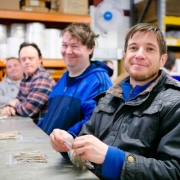Creating better jobs and careers for disabled people
The recent Paralympic Games remind us how disability can motivate and challenge the public to see beyond the disabled stereotypes, but often the images and memories disappear quickly once they are over, as we see medallists struggle with barriers encountered in daily life, e.g. access to decent toilets on trains.
#ImpossibleToIgnore is not just a hashtag. It’s a call to arms.
During the Paralympics our athletes can break down barriers and change the way we think about disability.
But 49% of disabled people say they feel excluded from society.
We want to change that.
— ParalympicsGB (@ParalympicsGB) September 6, 2021
Having had a temporary disability myself (I have now recovered), I have a much greater appreciation for how little mainstream society considers the needs and challenges that disabled people face. It is not only equality of access to things like services and jobs, it is attitudes towards disability which can make people feel worthless and unable to contribute to society or the economy. This has been made worse by policies such as the move to Personal Independence Payments, which have contributed to the marginalisation of those in need of financial support to maintain a decent quality of life.
The government estimates that there are around 14 million disabled people in the UK, but nobody knows the true figures, as many people do not declare their disability or see themselves as disabled for a variety of reasons, including the stigma of being labelled. Whilst 4.4m disabled people are employed, you are twice as likely to be unemployed if you are disabled. Those in work also report discrimination around perceptions of the types of suitable job roles, a lack of flexibility and adjustment to help people participate and being overlooked for promotion.
In a world where business is increasingly about recovery and a positive contribution to people and planet, actively engaging and being inclusive as an employer is an essential part of the picture and makes best business sense especially at a time of staff shortages.
The delayed National Disability Strategy, which was published last month, seeks to address some of the points that have been made about employing disabled people, but the reality seems to be very slow progress, for those who have been observing this sector for a number of years. We agree with our partner UnLtd, which stated in a recent blog on the topic that they welcomed a commitment to more support for disabled people starting a business via BEIS, but the lack of formulation of any detail of what this might look like is frustrating.
“while many proposals in the strategy are welcome, the speed and scale of action isn’t proportionate to the enormity of what we need to tackle”
Read our full response to the Government’s #NationalDisabilityStrategy here –https://t.co/alJJ8WOTwP @DisabilityGovUK
— UnLtd (@UnLtd) August 6, 2021
Disabled employment campaigners, such as Jane Hatton from social enterprise Evenbreak (a specialist job board for disabled people), call for mandatory reporting for all employers, which the Strategy currently falls short on (preferring only to look at this issue with larger employers, with no firm commitment). This reporting should also include retention, progression and equality of pay.
We also welcome a recognition that Supported Businesses have played an important role in pioneering best practice for those people that need more support than the standard Access to Work package. The Strategy mentions for the first time the Proof of Concept for businesses that can be more flexible with their support and help those with more challenging access issues onto the first rung of employment with intensive support, with the goal to ultimately help them access a job in mainstream employment.
We have been working with DWP on this issue for a number of years as an active member of the Supported Business Steering Group and are keen to open this opportunity out to more social enterprises. However, we believe that these jobs must be of a high quality and fulfilling, allowing progression into equally high-quality jobs.
 This is why we developed the Social Enterprise Disability Employment Mark (and Local Authority Disability Employment Mark) – to verify and accredit the motivations and credentials of those businesses that carry out this important task.
This is why we developed the Social Enterprise Disability Employment Mark (and Local Authority Disability Employment Mark) – to verify and accredit the motivations and credentials of those businesses that carry out this important task.
We are currently piloting the assessment process alongside the DWP Proof of Concept roll out.
Ultimately all employment should be an activity that improves self-worth and confidence. In a world where business is increasingly about recovery and a positive contribution to people and planet, actively engaging and being inclusive as an employer is an essential part of the picture and makes best business sense especially at a time of staff shortages. Social enterprises and the supported business sector are leading the way in helping to create more inclusive businesses, but they need the support of government to help to achieve this both in terms of resources, recognition and urgency.






Leave a Reply
Want to join the discussion?Feel free to contribute!